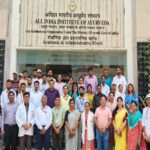“Only about 1% to 2% people have access to palliative care in India”
New Delhi, August 5, 2018:
The Lancet Commission on Access to Pain Relief and Palliative Care in 2017 finds that 61 million people around the world have ‘serious health-related suffering’ (SHS) which necessitates palliative care. At least 10 million of them are in India. However, only 1% to 2% people have access to such care or pain management in the country. Although there is a national programme for palliative care, medical students do not learn pain management from the curriculum.
Palliative care is treatment aimed at improving the quality of life of patients and their family members when they face serious health problems. That suffering can be physical such as breathlessness, pain, a nasty wound or psychological, social, or spiritual such as depression, social isolation.
Speaking about this, Padma Shri Awardee, Dr KK Aggarwal, President, HCFI, said, “The palliative approach is one that looks not just at the difficult symptoms of an illness, but also on the overall benefits and/or side effects of possible treatments. Above everything, such care addresses the emotional, physical, and financial stresses of a person dealing with a serious, perhaps life-threatening, disease. Though there is an understanding of this concept, it is yet to take off in India, barring few private entities that are into home-based care. One reason for this could be that medical practice in India is disease based and not person based. Doctors and healthcare establishments carry on treatment fearing the wrath of the patient’s family, a case that has even led to violence against doctors several times. Kerala has been a pioneer in this regard, followed by Karnataka and Maharashtra.”
Estimates suggest that there are about 3 million patients with cancer in India at any point in time. About two-thirds of them are in pain and one-third in severe pain needing strong analgesics. It is estimated at least 60% to 80% of these patients need palliative and end-of-life care.
Adding further, Dr Aggarwal, who is also the Group Editor-in-Chief of IJCP, said, “It is not an uncommon wish to attain a peaceful death especially in those with a critical/terminal illness. Many cultures and religious beliefs offer practical ways to enhance having a peaceful death. Dying in an intensive care unit is unnatural and oftentimes painful for the patient and their loved ones. Caregivers and nurses can help promote peaceful death through a three-dimensional process: awareness of dying, creating a caring environment, and promoting end-of-life care.”
It is the Vedantic principle of “welfare of the society” which makes doctors special and different in the society. The day this aspect of welfare is lost, society may not accord us the same respect as they have been doing so till now. Principles involved in acting towards the welfare of the society includes giving 10% of our time to charity; not charging any fee from those who cannot afford; charging less from the middle class and charging normal from people who can afford and where reimbursements are available. Integrating training in palliative care into the medical curriculum will also pave the way for better trust on doctors by patients.







